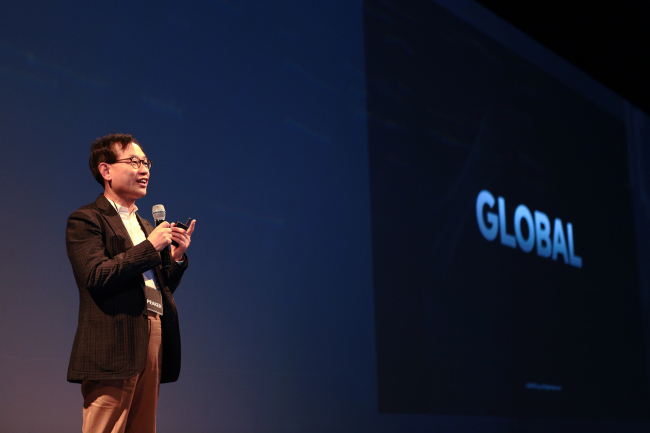Naver, the nation’s largest search engine, has reaffirmed its ambition for global success ― a goal that has never been truly achieved by a Korean Internet company.
“Now when companies are competing in a single world market, going global is crucial for our survival,” CEO Kim Sang-hun told reporters during the company’s annual conference in Seoul on Tuesday.
“We are going back to the hungry spirit with which we knocked the door of the Japanese market 15 years ago.”
 |
Naver CEO Kim -hun speaks at the company’s annual business conference at a Seoul hotel on Tuesday. Naver |
In the late 1990s when tech ventures were burgeoning in Korea, Naver, then a 2-year-old start-up, entered the Japanese market by establishing Naver Japan in 2000.
While its market share soared on its home turf, the Japanese were still lukewarm. In 2005, the company had to suspend its search engine service there.
Then, a deadly earthquake hit Japan in March 2011. Like other Japanese, workers at Naver Japan were forced to stay at home and communicate with each other only through Internet phone services.
When they returned to work a month later, an idea came up ― an Internet-based mobile messenger, through which user location can be easily shared and read receipts checked.
In June that year, Naver launched Line, which has become one of the most widely used chat apps in Asia.
At the time, the smartphone penetration rate in Japan was less than 30 percent. But the figure assured a growth potential. With the wider adoption of smartphones there, Line introduced new services to appeal to picky Japanese users.
Naver may have lost in its home market to the immensely popular mobile messenger KakaoTalk, but Line continued to expand its reach not just in Japan but also in other Asian countries.
Currently, there are 212 million users around the world. As of October, the app tops both Apple’s App Store and Google Play in terms of revenue.
Line’s chief technology officer Park Eui-vin touted the app’s compatibility with 14 user environments ranging from iOS and Android to Windows and Chrome ― the largest number among chat apps on the market ― as the secret behind its success.
“Line also boasts the best privacy protection. Due to our higher coding technology, there is no way for others to read the conversations,” she said, adding it would work more closely with developers around the world.
Despite the robust growth over the years, Line still faces challenges outside Asia.
In the third quarter this year, Line attracted 7.3 million more users in four key markets ― Japan, Thailand, Taiwan and Indonesia ― but lost 6.1 million users in other regions.
The app still appears to be struggling to impress users especially in the U.S., the all-important market for global tech firms.
"We are not focusing on increasing user numbers in the markets where Line is not the top player. We will put more focus on offering diverse customized services,” the CTO said.
In the U.S., the company is testing three new services for upcoming launches, including a tag-based location tracking service called Tale.
Naver chief Kim also admitted appealing to global users is “extremely difficult.”
“We cannot bring all Naver services to global markets even though they have been successful in Korea. We are fine-tuning individual services for different markets,” the CEO said.
Beyond Line, he pinned high hopes on other services such as webtoons, group-chatting app Band and V App, a real-time content streaming service featuring K-pop stars.
“Software power is important in an era of technology convergence. We are increasing investments in tech start-ups and have plans to acquire them,” he said.
About the delayed IPO of Line, the CEO said related talks were still underway, but where and when to do so had not yet been decided.
By Lee Ji-yoon (
jylee@heraldcorp.com)








